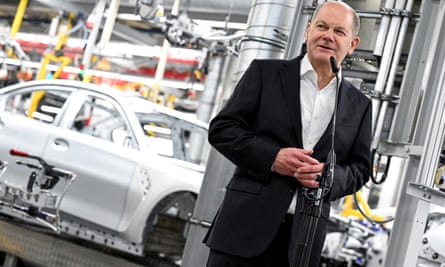The implementation of heat pumps in Germany could be jeopardized as the government has halted subsidies for climate-related initiatives.
Germany has indefinitely halted a set of subsidies that are crucial for achieving climate objectives. This decision may hinder the implementation of heat pumps as the country tries to address a multi-billion-euro deficit in its budget.
The coalition government led by Olaf Scholz has put a temporary halt on nine funding programs, which encompass a range of initiatives such as promoting energy-efficient homes and providing cargo bikes for commercial purposes. This decision is part of their efforts to save approximately €17 billion (£15 billion).
Last month, the government faced a dilemma on how to fund its large-scale environmental and industrial transformation program (KTF) after the highest court in the country halted their plan to use €60bn in pandemic-related borrowing for it.
The coalition government, consisting of Scholz’s Social Democrats, the Greens, and the FDP, has been trying to come up with solutions to address the budget deficit. On Monday night, the Bafa, a sub-agency of the economic ministry, announced the specific sectors that will be affected.
Discussions regarding methods to increase energy efficiency in residential buildings, which have received financial support of thousands of euros per household, and the financing of community-based renewable energy projects for land-based wind are some of the impacted actions.
According to Bafa, individual requests for funding that have already been accepted will continue as planned. However, leaders in the industry expressed concern that the temporary pause may impact market confidence and delay progress.
The German government’s efforts to reduce the use of fossil fuels by households will be negatively affected by cuts to subsidies for heat pump installations, a crucial element in this strategy.

Germany currently lacks approximately 20,000 engineers who are qualified to install heat pumps. As a solution, subsidies have been implemented to support the education and training of a new wave of installers.
Environmental reform observers are expressing frustration over the government’s priorities, as subsidies for electric vehicles remain unaffected.
On X, Ingwar Perowanowitsch, a political scientist who focuses on the climate crisis and is based in Germany, stated:
It is difficult to comprehend which funding was halted yesterday as a result of the budget crisis. This includes support for effective heat networks, energy consultations for households, promoting an energy-efficient economy, the program for installing heat pumps, and electric cargo bikes. It is unclear which initiatives were not affected, such as the environmental incentive for electric cars.
Environmentalists are accusing the German car industry of receiving special protection from the government due to its delayed adoption of electric cars.
Germany’s efforts towards environmental change have been praised by many, but they have also sparked disagreement among political parties within the country. The far-right AfD and the right-wing CDU have accused the government of creating an “eco-dictatorship” by promoting the transition from fossil fuels to cleaner options in both the industrial and private sectors.
The heat pump is now seen by AfD supporters as a representation of an effort to impose a less stable and prosperous way of life on them. It has also sparked controversy in Germany’s cultural debates, with the AfD equating the government’s energy transition plan to laws that allow easier self-identification for transgender individuals.
Alice Weidel, the co-leader of the party at the national level, stated at a party event in the fall: “We are facing intimidation … People are no longer given the freedom to decide on their preferred heating system for their basement. However, we are allowed to choose our gender identity on a yearly basis, whether it be male, female, or something else.”
During the fall season, the government had to revise its regulations regarding the timeline for individuals to transition from gas boilers to more eco-friendly options. This was a result of pushback from the business-friendly FDP party, with support from the opposition parties CDU and AfD.
The finance minister and leader of the FDP, Christian Lindner, expressed approval for the modifications. He believes that by allowing more time for the transition, they will reduce government interference in the lives of Germans.
He stated that the fear of the state invading people’s boiler rooms is no longer a law.
The Green party’s economy minister, Robert Habeck, stated that the modifications would hinder Germany’s progress in transitioning to green heating and cause them to miss their emission reduction targets.
Source: theguardian.com

